pfSense 2.6 will not reboot in Proxmox :(
-
@stephenw10
RAM disks... Ahh: System->Advanced->MiscYep, same as before.
40mb /tmp, 200mb /var, backups as default.Duuuhhh. Of course that means final shutdown log is lost. Will convert to normal for testing...
-
When you enable ram disks the logs are stored in ram so to avoid losing them they are written out to the drive at shutdown and then rebuilt again at boot. Anything that happens in between those things will be lost. You would still see messages in the Proxmox GUI.
But more importantly it looks like it's trying to backup the captive portal vouchers file and the script is not present. I would expect it to just do nothing at that point and continue to the next script though.
The output you're seeing though looks like it's reached the end of the shutdown scripts, it's unmounted the drives by that point. The next thing it should normally show isRebooting...Do you have the Captive Portal enabled?
Are you using ZFS?
Steve
-
- ZFS Yes
- Captive Portal: Nope, nothing there. Didn't even know what it was ;)
HOWEVER: searching my config.xml file, I found that CARP Sync for Captive Portal is enabled. (As recommended, I enabled everything.... although now the DHCP forwarder checkboxes are not checked... perhaps because I don't use them?)
-
Hmm, I did a lot of testing in Proxmox (and I know others did) and never saw this.
Not seeing it now on a 2.6 VM with ramdisks enabled.
I wonder if you have something odd in the VM config...
If you can try cloning the VM and defaulting the config. If that still fails to reboot I would think it has to be something in the VM setup. Not sure what though...If it's still doing anything when it stalls like that it should report it if you enter
ctl+t. It wil tell you what process it's waiting on.Steve
-
For reference:
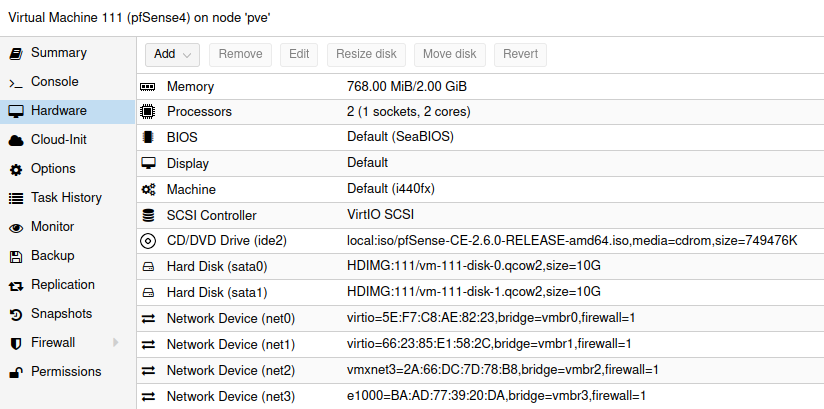
-
We have two significant configuration differences.
-
I'm using the modern UEFI bios
-
I'm using the q35 rather than i440 CPU. And passing [host] through (on "Processors" line)
Otherwise, nothing exciting.
Either of these could be "it" I suppose.
UEFI is of course quite different.
q35 supports:
- PCIe (not just 1997 PCI)
- ICH9 chipset
- PCIe passthrough -- which I am using to achieve full gigabit performance in a VM.
-
-
What CPU are you passing to it?
-
@stephenw10
One is i7-3770 (giving 4 cores; has AES-NI, Active according to pfSense)
The other is i7-4770 (similar but faster) -
Hmm, nope still reboots fine here with:
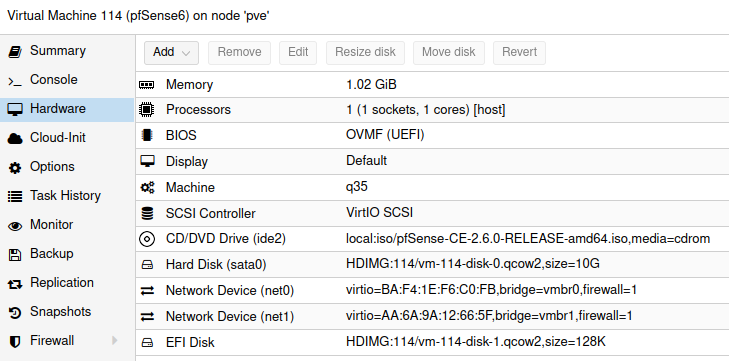
Maybe you have a non-default option?
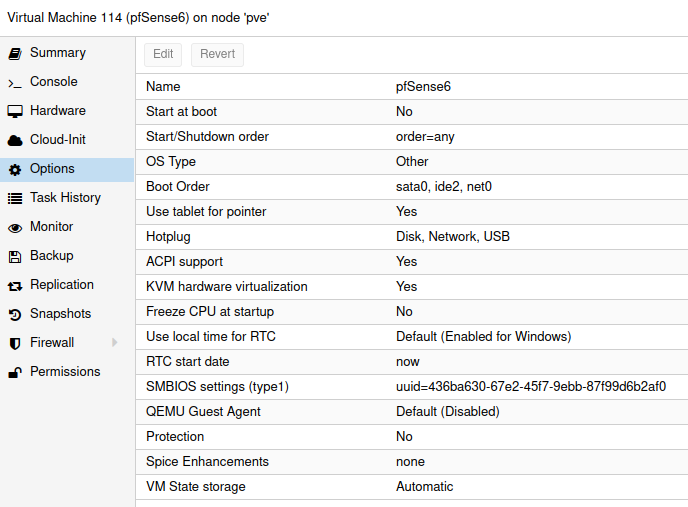
qemu guest agent maybe? Seems most likely...
-
@stephenw10 I definitely use qemu-guest-agent.
Just ran a set of tests:
..
BIOS: reboots fine, shuts down fine. (Screen is 25 lines ;) ). Either i440 or q35UEFI: does not reboot, either i440 or q35. With i440 I do see "Rebooting..." but it doesn't.
Will check options... I know for sure I am setting UUID -- started out with identical UUID to primary CARP, which caused other trouble, so I set a different one.
- I had OS type Linux (auto set for recent). Reset to "Other"... did not help.
- Yes I had q-g-a...
-
Can you disable/remove the qemu agent as a test?
-
BUMMER. OK, duplicating close to yours, but with the one change I know breaks mine:
- i440FX
- UEFI (this breaks it for me)
- pkg remove qemu-guest-agent**
Still no reboot.
**Note: don't know how it does it, but even though rclocal has enable q-g-e YES,... by disabling in Proxmox, when I looked in pf, it was NOT running. Not trusting that... I completely uninstalled it.
So:
- On 2.5.2 I have had zero issues with this aspect of my config. I was running ZFS.in 2.5.2
- I reinstalled 2.6 into the exact same VM.
- On 2.6, on my host, if I use UEFI then pfSense will not reboot
I will test tomorrow to see if VM running BIOS is a viable workaround for my situation for now.
If you have further testing ideas, I'm all ears. Will do it early AM tomorrow. Now, gotta run. THANK YOU!!!!

-
What version of Proxmox are you running?
-
root@pve1:~# pveversion pve-manager/7.1-10/6ddebafe (running kernel: 5.15.12-1-pve) -
Hmm, OK I'm still running 6.4 but I know others here are running 7 and not hitting this.
Well I would be trying to replicate this on a clean install with a basic setup on your host. It's either something in the VM setup of the pfSense config and that would rule one of those out.
Steve
-
@stephenw10 I'm on a close-to-clean install, as this was full reinstall for 2.6. Of course I reloaded my config.xml
I can do that in chunks, perhaps...
- Plain install, no config at all. See if even that fails
- Install, load config, no packages
- Then start making smaller changes if we haven't nailed it.
-
@stephenw10
Several lessons learned so far. This is from installing the 2.6 iso, using as "default" as I could, other than setting UEFI:See screen grabs below for working almost-default settings.
- ISO permissions must be set to 654 (Group executable) or it can't boot.
- While your VM uses type "Other", that produced a bad VM for me (EFI partition too small, and would not boot for install.) Setting up VM at least initially as "Linux" (which it picks based on the ISO) produces better settings.
- WIth UEFI, un-check "Pre-Enroll Keys" to avoid the Windows-style IOS security check, which will fail.
That's enough for install to work. :)
The good news: This setup does reboot.
The bad news: modifying my plain test install+reconfig setup to exactly match, does NOT reboot.So on to phase two testing but no time today (during normal hours at least.)
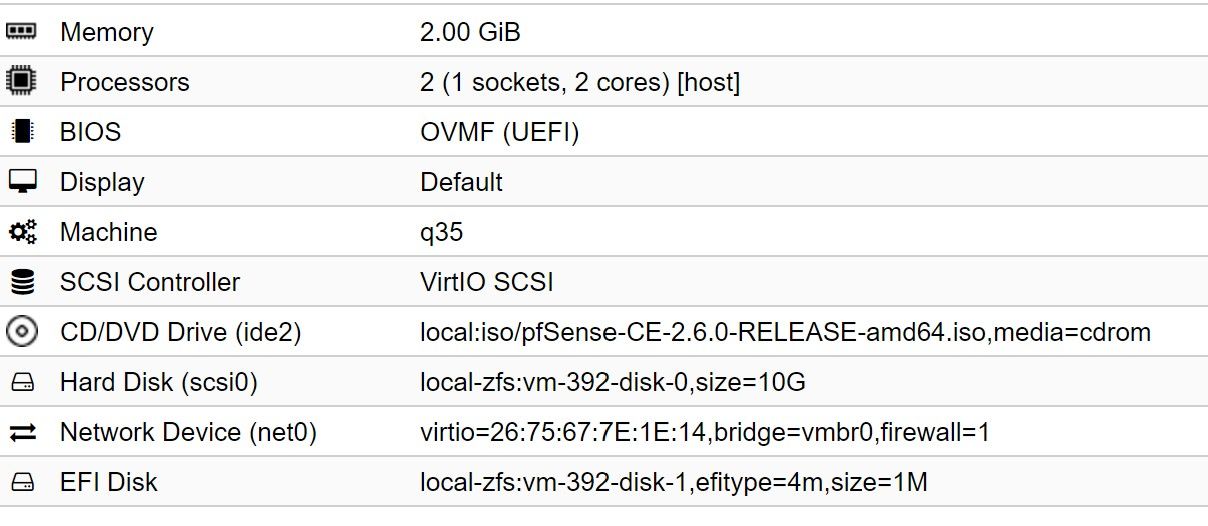
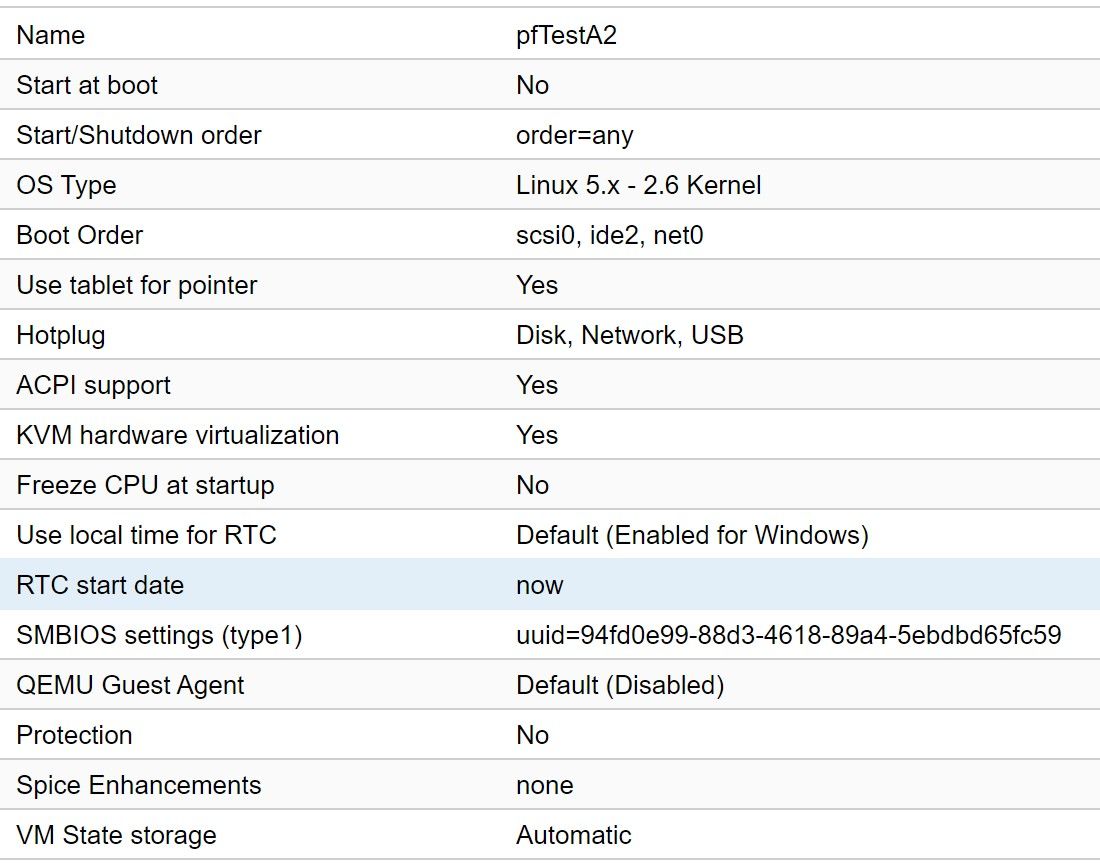
-
Hmm, interesting.
I didn't do anything speci8al with the ISO. Simply picked the image for the drive.
I have tested both Other and Linux, both worked for me with UEFI.
I guess 'Pre-Enroll Keys' is a new option in 7, I don't see it in 6.4.Steve
-
 S stephenw10 moved this topic from General pfSense Questions on
S stephenw10 moved this topic from General pfSense Questions on
-
@stephenw10 That makes sense.
One thing that was different: if I choose "Other" then the EFI partition is WAY too small for Linux.
More tests coming...
-
Yeah, that's good to know. This info is sure to help someone else who hits this.
